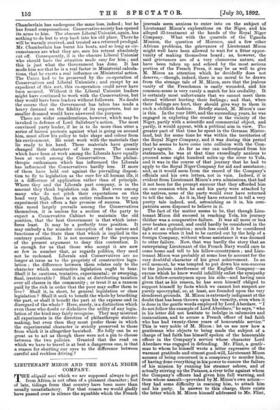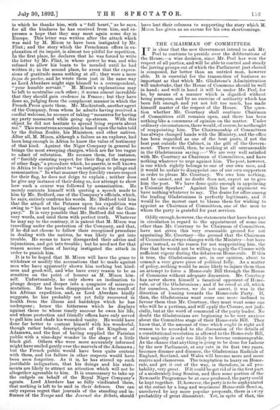IIE U thNANT 111ZON AND THE ROYAL NIGER COMPANY.
rpHE aliguid novi which we are supposed always to get _L from Africa, is not often of a pleasant character; but of late, tidings from that country have been more than usually unsatisfactory. For that reason we would gladly have passed over in silence the squabble which the French journals seem anxious to enter into on the subject of Lieutenant Mizon's explorations on the Niger, and his alleged ill-treatment at the hands of the Royal Niger Company. What with the quarrels of the Uganda Mission, the question of Morocco, and a few other African problems, the grievances of Lieutenant Mizon might well have been allowed to wait for a fitter oppor- tunity of making themselves heard ; as, however, the said grievances are of a very clamorous nature, and have been taken up and echoed by the most serious portion of the French Press, it may be as well to give M. Mizon an attention which he decidedly does not deserve,—though, indeed, there is no moral to be drawn from the strange tale of M. Mizon, save that the jealous vanity of the Frenchman is easily wounded, and his common-sense is very rarely a match for his credulity. It is certainly most unfortunate that we cannot meet them abroad without hurting their feelings ; and that, when their feelings are hurt, they should give way to them in such a childish fashion. Briefly stated, M. Mizon's case is this. In the year 1890, and the succeeding years, he was engaged in exploring the country in the vicinity of the Niger, partly with a scientific and commercial object, and partly, it would appear, with a political aim in view. The greater part of that time he spent in the German Hinter- land, but for some time he was within the territories of the Royal Niger Company, and it was during this period that he seems to have come into collision with the Com- pany's agents. As far as one can understand from his statements, he was at that time exceedingly anxious to proceed some eight hundred miles up the river to Yola, and it was in the course of that journey that he had to apply to the Royal Niger Company for aid and assistance ; and, as it would seem from the record of the Company's officials and his own letters, not in vain. Indeed, it is evident from Lieutenant Mizon's own admissions, that had it not been for the prompt succour that they afforded him on one occasion when he and his party were attacked by the natives, none of the party would ever have returned to tell the tale. As it is, they have returned to tell a very pretty tale indeed, and, astonishing as it is, his com- patriots seem disposed to believe in it.
The fact of the matter seems to be, that though Lieu- tenant Mizon did succeed in reaching Yola, his journey thither was a comparative failure. It was all more or leis over beaten ground, and could hardly be considered in the light of an exploration ; much less could. it be considered as a success when it had to be carried out by the help of a foreign Company, without whose assistance it was doomed to utter failure. Now, that was hardly the story that an enterprising Lieutenant of the French Navy would care to come home and tell to his fellow-countrymen ; and Lieu- tenant Mizon was probably at some loss to account for the very doubtful character of his great achievement. In an evil moment, he was tempted to put down his non-success to the jealous interference of the English Company—an excuse which he knew would infallibly enlist the sympathy of his fellow-countrymen upon his side—and having once given that as his reason, he has seen himself obliged to support himself by facts which we cannot but suspect are purely apocryphal, or, at least, are founded upon the very slenderest grounds. M. Mizon is extremely indignant at the doubt that has been thrown upon his veracity, even when it is done in the gentle words employed by Lord Aberdare. "I do not follow the example of Lord Aberdare," he says, "who in his letter did not hesitate to indulge in calumnies and insinuations, and to accuse a French officer of bad faith who has had twenty-three years of honourable service." This is very noble of M. Mizon : let us see now how a gentleman who objects to being made the subject of a charge of bad faith has himself spoken of the honourable officer in the Company's service whose character Lord Aberdare was engaged in defending. Mr. Flint, a gentle- man to whom he himself wrote a letter expressive of the warmest gratitude and utmost good-will, Lieutenant Mizon accuses of being concerned in a conspiracy to murder him, of having done everything in his power to ensure the failure of his mission by running his steamer ashore, and of actually stirring up the Patanes, a river tribe against whom the Company's officers had given him full warning, and from whose assault—provoked by M. Mizon's own action— they had some difficulty in rescuing him, to attack him and his party. In answer to this charge, there exists the letter which M. Mizon himself addressed to Mr. Flint, in which he thanks him, with a "full heart," as he says, for till the kindness he has received from him, and ex- presses a hope that they may meet again some day in Europe. This letter was written after the attack which was said by M. Mizon to have been instigated by Mr. Flint ; and the story which the Frenchman offers in ex- planation of its import, is almost too pitiful for repetition. In the first place, he declares that he was forced to write the letter by Mr. Flint, in whose power he was, and who refused to allow his boats to be mended until he had written it; in the second place, he avers that the expres- sions of gratitude mean nothing at all ; they were a mere facon de parler, and. he wrote them just in the same way as Lord. Aberdare might sign himself to a correspondent, "your humble servant." M. Mizon's explanations may be left to neutralise each other ; it seems almost incredible that they should gain credence in France ; but they have done so, judging from the complacent manner in which the French Press quote them. Mr. Mackintosh, another agent of the Company, from whom he admits having received. a cordial welcome, he accuses of taking "measures for having my party massacred while going up-stream. With this object he did. not hesitate to spread lying reports about me." This monstrous accusation is based upon the tales told by the Sultan Zoubir, his Ministers, and other natives. After all, M. Mizon, although a failure as an explorer, had been long enough in Africa to know the value of testimony of that kind. Against the Niger Company in general he brings the most sweeping charges, which are far too vague to admit of refutation. He accuses them, for instance, of "forcibly ensuring respect for their flag at the expense of other flags," a procedure which, he asserts, is well known in Africa to be equivalent to "an instigation to pillage and assassination." In what manner they forcibly ensure respect for their flag, he does not deign to explain ; neither does he give any instance of their doing so, nor attempt to show how such a course was followed by assassination. He merely contents himself with quoting a speech made to him by Mr. Bedford, one of the Company's officials, which, he says, entirely confirms his words. Mr. Bedford told him that the attack of the Patanes upon his expedition was owing to "his not having observed the rules of the Com- pany." It is very possible that Mr. Bedford did use those very words, and used them with perfect truth. Whatever he may say to the contrary, it is patent that M. Mizon was travelling under the protection of the Company, and that, if he did not choose to follow their recognised procedure in dealing with the natives, he was likely to get into trouble. He seems to have disregarded their advice and injunctions, and got into trouble ; but he need not for that reason accuse them of having instigated the attack in order to punish him.
It is to be hoped that M. Mizon will have the grace to withdraw or modify the accusations that he made against men who have apparently shown him nothing but kind- ness and good-will, and. who have every reason to be as sensitive on the point of honour as M. Mizon him- self. Unfortunately, he only shows an inclination to plunge deeper and deeper into a quagmire of misrepre- sentation. He has been disappointed as to the result of his African expedition, and, as Lord. Aberdare kindly suggests, he has probably not yet fully recovered in health from the illness and hardships which he has undergone ; hence the bitterness which he displays against those to whose timely succour he owes his life, and. whose protection and friendly offices have only served to gall him and chafe his wounded vanity. He would. have done far better to content himself with his wonderful, though rather belated, description of the Kingdom of Adamawa, and the feat of having supplied. the Parisian public with a nine-days' wonder in the shape of a little black girl. Others who were more accurately informed might have smiled gently over the marvels of the Adamawa ; but the French public would. have been quite content with them, and his failure in other respects would. have been soon forgotten. As it is, he has stirred up such justifiable indignation, that his doings and his state- ments are likely to attract an attention which will not be altogether agreeable to him. It is unnecessary to take up the cudgels on behalf of the Royal Niger Company's agents. Lord. Aberdare has so fully vindicated them, that nothing is left to be said in their defence. One can only express regret that journals of the standing and in- fluence of the Temps and the Journal des Daats, should have lent their columns to supporting the story which M. Mizon has given as an excuse for his own shortcomings.



































 Previous page
Previous page